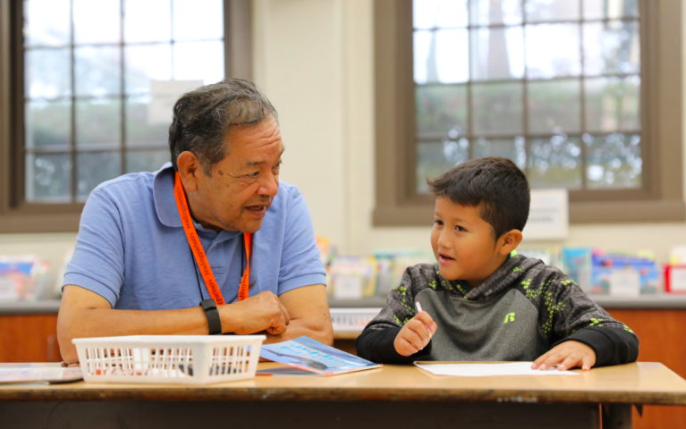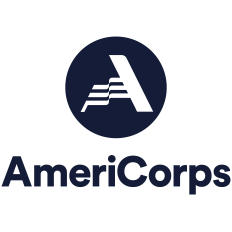July 30, 2020
Intergenerational programs can help out-of-school kids

Originally published on EdSource
With just weeks before the fall semester begins, school districts are grappling with reopening decisions as Covid-19 cases rise across the country.
It’s obviously a tough choice. We know that little can replace the hours of in-person instruction children should receive each day, and researchers and educators are so worried about these growing deficits that the term “Covid slide” has supplanted the “summer slide.”
But intergenerational programs can help fill that gap.
In an educational setting, these programs leverage the skills and talents of older adults to help students learn. But it’s not just the students who benefit — these programs give older adults a sense of purpose and connection to a younger generation. In a time when we’re asking older adults to stay home for their own good, they are at increased risk for social isolation, which is linked to poor health outcomes. These programs benefit old and young alike.
In the spring, nonprofits with intergenerational programs across the country pivoted admirably to remote sessions. For low-income students in particular, this supplemental instruction is a free, reliable and personalized way to maintain educational momentum in the face of increasing odds.
Reading Partners is a national literacy nonprofit with a significant presence in Los Angeles and the Bay Area that brings volunteers into public schools to work one-on-one with K-fourth-grade students struggling to read. Because these programs are usually happening during the school day, older volunteers are an important part of their efforts.
Students reading below grade level by the fourth grade are four times less likely to graduate high school on time — and 82% of low-income students were not hitting that mark before the pandemic began.
To make sure this disparity doesn’t worsen, Reading Partners has adapted their in-person curriculum to a virtual setting to help reinforce the reading and language arts skills these students need to succeed. And despite the format change, older volunteers are eager to continue working with the students with whom they’ve built a trusted rapport.
826 programs in nine cities across the country, including Los Angeles and San Francisco, focus on student writing skills with both group and one-on-one opportunities facilitated by volunteers. In addition to tutoring programs and field trips during more regular times, the program has empowered tens of thousands of students each year by making them published authors.
As with Reading Partners, many of these programs take place during the school day, making older volunteers a particularly valuable demographic for recruitment.
In Los Angeles, 826 has quickly adapted its programming to both online and phone-based sessions, allowing volunteers and students to continue their existing tutoring relationships. Other locations have come up with additional creative volunteer-supported ideas for students to hone their craft.
School on Wheels in Southern California is working with students facing even more dire odds — those experiencing homelessness. While their after-school center on Skid Row currently sits empty, they have leveraged their previous experience with remote tutoring to adjust to this new normal. They’ve partnered with other nonprofits to get students laptops and access to other technology and moved many of their 2,500 tutors to online instruction, ensuring these students won’t be left behind.
In recent years, School on Wheels has made a concerted effort to recruit more older volunteers to do both in-person and remote tutoring, bringing in almost 500 new older volunteers in 2019 alone. Now, these volunteers continue the one-on-one connections online — connections that have not only improved students’ academic success, but also their self-confidence and future aspirations.
These organizations depend on volunteers, and have reported that their older volunteers are often their best — they are more reliable, patient and stay with the organization longer than younger volunteers. And despite the stereotype of a tech-averse older population, these organizations are finding that older volunteers are eager to adapt and continue their work.
Of course, these intergenerational programs were originally designed as supplements to full-time, in-person instruction. They are not a replacement for a traditional educational setting, and volunteers are not a replacement for teachers.
Many organizations report challenges around unsupervised remote interactions between students and volunteers, as well as struggles getting students the equipment and bandwidth they need to participate. But right now, we need to embrace every single opportunity to prevent our country’s children from falling behind.
Shoring up these programs will have multiple positive impacts on American society. Students will improve academically. Older adults can contribute their skills and reduce feelings of loneliness and isolation. And the connections between the two groups builds empathy and reduces ageism — particularly relevant as early descriptions of Covid-19 as an “old person’s disease” has led to increasing numbers of cases among young people.
Intergenerational programs efficiently help our students and older adults, and therefore our whole society — and as a country, we need to support and bring to scale as many of these programs as possible.










